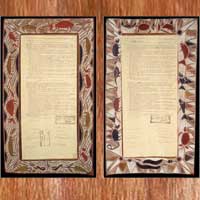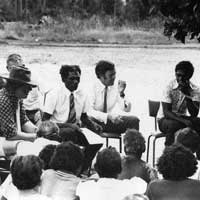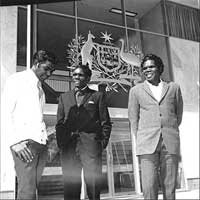Yirrkala bark petition, 1963
On 15 August 1963 the Melbourne Age reported under the headline 'House Hears Plea in Strange Tongue':
A petition was received by the House of Representatives - written in a First Nations language on a length of stringy bark. was presented to the House today. It began - 'Bukudjuini gonga yuru napurrunha yirrakilli [...]' Which means - 'The humble petition of the undersigned people of Yirrkala'.
This petition, signed by representatives of the tribal groups who lived on the Gove Peninsula west of Darwin, objected to a large mining venture which the federal government had approved without bothering to consult with the people whose families had lived there for many, many generations.
Yirrkala bark petition, 1963
To the Honourable Speaker and members of the House of Representatives in Parliament assembled.
The Humble Petition of the Undersigned Aboriginal people of Yirrkala, being members of the Balamumu, Narrkala, Gapiny, Miliwurrwurr people and Djapu, Mangalili, Madarrpa, MagarrwanaImirri, Djambarrpuynu, Gumaitj, Marrakulu, Galpu, Dhaluangu, Wangurri, Warramirri, Naymil, Riritjingu, tribes respectfully showeth.
- That nearly 500 people of the above tribes are residents of the land excised from the Aboriginal Reserve in Arnhem Land.
- That the procedures of the excision of this land and the fate of the people on it were never explained to them beforehand, and were kept secret from them.
- That when Welfare Officers and Government officials came to inform them of decisions taken without them and against them, they did not undertake to convey to the Government in Canberra the views and feelings of the Yirrkala aboriginal people.
- That the land in question has been hunting and food gathering land for the Yirrkala tribes from time immemorial: we were all born here.
- That places sacred to the Yirrkala people, as well as vital to their livelihood are in the excised land, especially Melville Bay.
- That the people of this area fear that their needs and interests will be completely ignored as they have been ignored in the past, and they fear that the fate which has overtaken the Larrakeah tribe will overtake them.
- And they humbly pray that the Honourable the House of Representatives will appoint a Committee, accompanied by competent interpreters, to hear the views of the people of Yirrkala before permitting the excision of this land.
- They humbly pray that no arrangements be entered into with any company which will destroy the livelihood and independence of the Yirrkala people.
And your petitioners as in duty bound will ever pray God to help you and us.
(English language translation.)
- Dhuwala yolnu mala galki, 500 nhina ga dhiyala wanganura. Dhuwala wanga Arnhem Land yurru djaw’yunna naburrungala.
- Dhuwala wanga djaw’yunna ga nhaltjana yurru yolnunundja dhiyala wanga nura nhaltjanna dhu dharrpanna yolnu walandja yakana lakarama madayangumuna.
- Dhuwala nunhi Welfare Officers ga Government bungawa lakarama yolnuwa malanuwa nhaltjarra nhuma gana wanganaminha yaka nula napurrungu lakarama, walala yaka lakarama, walala yaka lakarama Governmentgala nunhala Canberra nhaltjanna napurru ga guyana yolnuyu Yirrkala.
- Dhuwala wanga napurrunyu balanu larrunarawu napurrungu nathawu, guyawu, miyapunuwu, maypalwu nunhi napurru gana nhinana bitjarrayi nathilimirri, napurru dhawalguyanana dhiyala wanganura.
- Dhuwala wanga yurru dharrpalnha yurru yolnuwalandja malawala, ga dharrpalnha dhuwala bala yolnuwuyndja nhinanharawu Melville Baythurru wanga balandayu djaw’yun nyumukunin.
- Dhuwala yolnundja mala yurru nhamana balandawunu nha mulkurru nhama yurru moma ga daranun yalalanumirrinha nhaltjanna dhu napurru bitjarra nhakuna Larrakeahyu momara walalanguwuy wanga.
- Nuli dhu bungawayu House of Representatives djaw’yun yulnuwala nathili yurru nha dhu lakarama interpreteryu bungawawala yolnu matha, yurru nha dhu djaw ’yun wangandja.
- Nunhiyina dhu marrlayun marrama' ndja nhinanharawu yolnuwu marrnamathinyarawu. Dhuwala napurru yolnu mala yurru liyamirriyama bitjan bili marr yurru napurru nha gonga 'yunna wagarr'yu.
NAIDOC: 50 Years of the Yirrkala Bark Petition
Miranda Tetlow 195.7 ABC Darwin 5 July 2013

Wali Wunungmurra, Chair of the Northern Land Council and signatory of the Bark Pettion
Wali was just 17 when he signed the petition alongside his elders in Yirrkala. (Miranda Tetlow ABC Local)
He remembers the responsibility coming down on him "like a ton of bricks".
"I was under pressure by the old people! Because they saw me as an up and coming leader for the people, so I had no choice but to sign it."
Before assuming the mantle of leadership, Wali had fond memories of growing up in Yirrkala. "It's a very very beautiful place, overlooking the Arafura Sea. There was plenty for us, to go out hunting, fishing, camping and so forth. It was a very good time we had."
It was also the time of the Methodist Mission. Wali remembers, "Yirrkala was known to be a mission reserve for Aboriginal people. There were only 8 or 900 people living out there. I can well remember the days when I was growing up, I was going to school all the time. If we did turn up, we'd be given rations. And if we didn't turn up, then myself and the family, they wouldn't get a ration as well! So those were the times I was growing up in."
By 1963, mining interests were also gaining momentum around North East Arnhem Land.
Says Wali, "We didn't know what they were really asking for, because minerals to Aboriginal people at that time was a foreign idea. The old people saw them as pinching our land while they were digging for minerals, taking away land from us, something very very serious in Aboriginal culture."
It was this alarm amongst elders that led to the Bark Petition.
"We felt that we should make a stand and make some paintings to illustrate to the foreigners, the miners, telling them, look this is our land. The only way we can express ourselves and our feelings was through this bark painting. That we have got a live Aboriginal culture, that we are very much attached to the land and we are to here to look after the land and the land to look after us."
Wali says that he has been able to feel a sense of pride in the bark petition in the decades which have followed.
"Before then I wasn't feeling proud, just like it had been forced onto me. I didn't know what sort of impact I would have. And now I'm finding that the impact has grown to be really big and I'm happy about that. But there's more to it than just what's in the paper or in the artefacts."
The Bark Petition was the founding document for the Aboriginal land rights movement. It was the beginning of many inquiries, submissions and court cases, from the failed Gove land rights case against Nabalco in 1971, right up to the rejection of terra nullius in Mabo and the Blue Mud Bay decision of 2008 which granted traditional owners native title over intertidal zones.
Many things have changed in that time. As Wali acknowledges with a wry chuckle, "the wheel has turned": where the Bark Petition of 1963 protested against mining on Aboriginal land, today the refinery and mine are a crucial part of Aboriginal economic livelihood in North East Arnhem Land.
"We have fought hard to get what we are getting now," he smiles.
And Wali hopes for more change to come, particularly acknowledgment of Aboriginal people in the Australian Constitution. "If there's no place for Aboriginal rights in the Constitution, there's no place for our rights outside of it. We are the first people of this continent and we need to be recognised in the body of the Constitution. But it's up to the younger generation now."
Wali says he still goes to visit the petition when he's in Canberra.
"It takes me back. I can see, in my vision, the old people who were around at that time. And I see that bark petition as being at the beginning of a new generation, moving forward."




